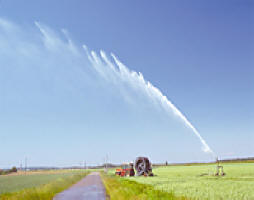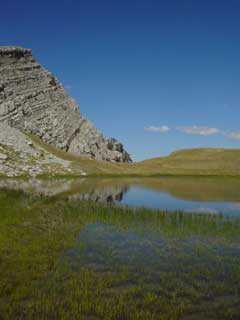 Spain sweats amid 'water wars'
Spain sweats amid 'water wars'
Spain is experiencing its worst drought in 40 years. Climate experts warn that the country is suffering badly from the impact of climate change and that the Sahara is slowly creeping north - into the Spanish mainland.
Yet in Spain itself there is little consensus about what is to be done. Indeed, such is the disagreement that journalists and politicians alike are calling it "water wars".
A farmer and politician, Angel Carcia Udon, said: "Water arouses passions because it can be used as a weapon, a political weapon, just as oil is a political weapon."
And water in Spain has set region against region, north against south and government against opposition.
When the city of Barcelona nearly ran out of water earlier this year, the fountains were switched off and severe restrictions were introduced.
The government of Catalonia pleaded for water to be transferred from rivers like the Ebro, in neighbouring regions, but they refused.
Instead, the city shipped in millions of litres of water from France and accelerated work on the giant desalination plant on the edge of Barcelona, which promises to provide 180,000 cubic metres of water a day.
Parched land
But Barcelona is not alone in its insatiable thirst. Apart from the far north, the entire country is suffering, especially the parched areas on the Mediterranean coast, from Catalonia, down through Valencia, Alicante, Murcia and Almeria.
Mr Udon, whose Popular Party (PP) believes in transferring water around the country, said: "It's incomprehensible that, in one country, there is an excess of water in one place and a deficit in another.
"Even more incomprehensible is that they expect us to use water from desalination plants, which is expensive and would force us to raise prices."
But when the present PSOE Socialist government of Jose Luis Rodriguez Zapatero got into power in 2004, they cancelled all the PP's plans to send water from the north-west to the arid zones of the south-east.
Instead, the government is building more desalination plants, adding to the more than 900 already in Spain - the largest number in any one country outside the Middle East.
They are working night and day at the one at Llobregat, close to Barcelona airport. The general manager, Juan Compte Costa, assured me that it was the most cost-effective and energy-efficient desalination plant yet.
Environmental row
Asked how much alternative energy it will use, he replied: "In this plant alone, we are talking about solar energy providing about one million kilowatt hours (kWh) a year, against the total consumption of 180 million kWh, ie less than 0.5%."He added that there simply were not enough sun hours in Spain to energise a plant of this size.
The opposition party, supported by some environmentalists, say that the ambitious desalination plant programme, with its huge energy needs, will only add to the amount of CO2 produced, which in turn will add to global warming and thereby increase Spain's problems.
The government, supported by other environmentalists (even the Greens disagree about water in Spain), argue that the expense and ecological damage caused by rerouting of rivers is far worse.
The desalination plant in Barcelona will not be ready in time to avert a water crisis again in Barcelona next spring, if the rains fail again this winter. It is just as well that the government of Catalonia has instructed all schools to add water conservation to the school curriculum.
"You must not leave the tap on for too long because water will be wasted and we won't have enough water in Barcelona," five-year-old Teresa solemnly told me on the way to the playground area in one of the city's parks.
Her friend, seven-year-old Carmen, then added: "If you want to shower in hot water, then you must collect the cold water that comes out first in a bucket and use it later to water the plants."
And from eight-year-old Juan: "If you don't have water, there are lots of things you can't do. You can't live without it. Without water we can't survive."
At least Spain has produced one good thing in this, the year of drought - some of the most environmentally aware children in Europe.
| Contact information |
Sue Lloyd-Roberts, BBC Newsnight, Barcelona
|
|---|---|
| News type | Inbrief |
| File link |
http://news.bbc.co.uk/2/hi/europe/7569022.stm |
| Source of information | BBC News |
| Keyword(s) | desalination, water wars, water transfer |
| Subject(s) | POLICY-WATER POLICY AND WATER MANAGEMENT , RISKS AND CLIMATOLOGY |
| Relation | http://www.semide.net/countries/fol135532/country824306 |
| Geographical coverage | Spain |
| News date | 19/08/2008 |
| Working language(s) | ENGLISH |
 you are not logged in
you are not logged in





